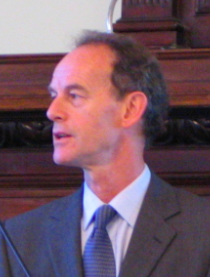This article includes a list of general references, but it lacks sufficient corresponding inline citations .(January 2022) |
Peter Simons | |
|---|---|
 Simons in 2008 | |
| Born | 23 March 1950 |
| Education | |
| Doctoral advisor | Wolfe Mays |
| Philosophical work | |
| Era | Contemporary philosophy |
| Region | Western philosophy |
| School | Analytic philosophy |
| Main interests |
|
| Notable ideas | Truthmaker theory |
Peter Murray Simons, FBA (born 23 March 1950[ citation needed ]) is a British retired philosopher and academic. From 2009 to 2016, he was Professor of Moral Philosophy at Trinity College Dublin; [1] he is now professor emeritus. [2] He is known for his work with Kevin Mulligan and Barry Smith on metaphysics and the history of Austrian philosophy. [3] Since 2018 he is visiting professor at the University of Italian Switzerland. [4]